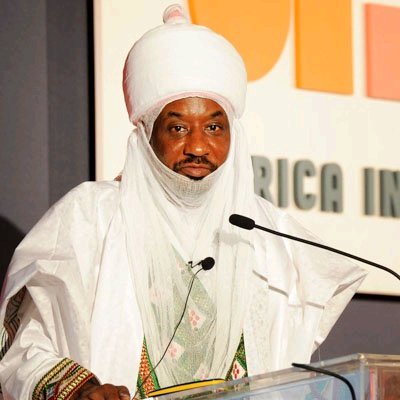Sanusi II, When I Was Governor Of Central Bank In 2011, We Advised The GEJ To Remove Fuel Subsidies
The Emir of Kano, Muhammadu Sanusi II, has revealed that during his tenure as the Governor of the Central Bank of Nigeria (CBN) in 2011, he and his team advised then-President Goodluck Jonathan to remove fuel subsidies. Sanusi described it as “poetic justice” that those who strongly opposed the move through the Occupy Nigeria protests are now in government implementing the very same policy.

Speaking during an interview on News Central TV, the former CBN Governor defended President Bola Ahmed Tinubu’s decision to remove fuel subsidies, arguing that it was a necessary step to rescue the economy from further collapse.
He explained that the current administration’s bold move mirrors the same advice he gave over a decade ago to the Jonathan administration, which was met with strong resistance at the time.
Sanusi explained that the government’s decision to eliminate the subsidy completely, rather than gradually, was driven by the need to prevent powerful vested interests and profiteers from sabotaging the process.
He noted that in 2012, when President Jonathan attempted to partially remove subsidies, the backlash from vested interests and widespread public protests led to a complete reversal of the policy.
In his words: “You know there is a kind of poetic justice here. When I was governor of Central Bank in 2011, we advised the president to remove fuel subsidies. Subsidies were removed, and some people went on demonstration Occupy Nigeria opposed it. And now they are in government, and they have had to do it because that is the reality. Those subsidies needed to go. What the president did was absolutely necessary. And my experience with these things is, if you say you are going to remove subsidies gradually in this country, the vested interests and those who have profited from subsidy would make it difficult for you to complete it.”
Sanusi emphasized that the fuel subsidy regime had long been unsustainable, pointing out that it drained government resources and disproportionately benefited a small group of wealthy individuals who manipulated the system for personal gain. According to him, the policy removal, though painful in the short term, was vital for economic stability and national development.
He added that Nigeria had spent trillions of naira subsidizing fuel imports while critical sectors like education, health, and infrastructure remained underfunded.
“The truth is that Nigeria could no longer afford it,” he said, stressing that the removal was a necessary step toward restoring fiscal discipline and economic growth.
Sanusi further explained that the uproar against subsidy removal in 2012 was largely political. He noted that many of those who opposed the Jonathan administration’s policy were not necessarily against the principle of subsidy removal but used the protests to score political points.
“The irony,” he said, “is that the same individuals are now in power, facing the same realities we faced back then.”
The former CBN governor, known for his outspoken views on economic policy, also urged the government to ensure that savings from the subsidy removal are transparently utilized to improve public services and social welfare.
He stressed the importance of building public trust by showing Nigerians tangible benefits from the painful economic adjustments.
Sanusi concluded that the removal of fuel subsidies was “not a matter of choice but of necessity,” adding that no serious economist could defend a policy that had long encouraged inefficiency and corruption.




